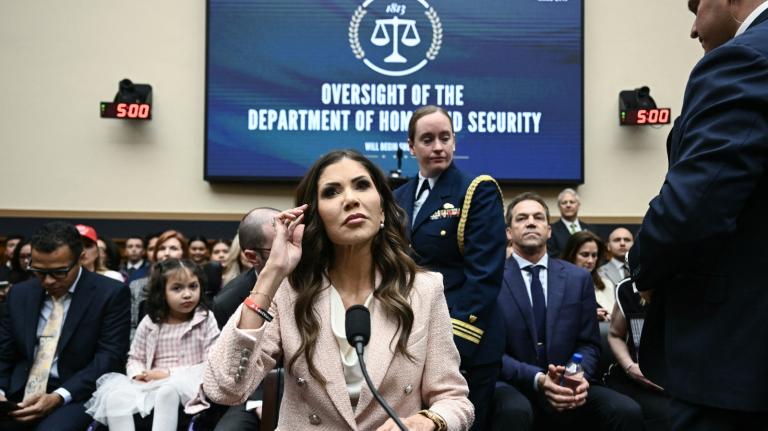In 2005, Henry Paulson stepped down as chief of Goldman Sachs to become President George W. Bush’s Treasury secretary. The Wall Street-to-Treasury story is a bit dog-bites-man; Robert Rubin had taken the exact same path a decade before under Clinton.
Yet Paulson’s appointment generated excitement in green circles, of all places. The new secretary had sat on the board of the Nature Conservancy and collaborated on projects with Conservation International. An article by Grist’s own Amanda Griscom Little summed up the mood. She quoted Conservation International Chair and CEO Peter Seligmann:
My hope is that Paulson will raise the level of understanding around these issues [i.e., climate] within this inner circle, and rally a critical mass that will push the administration to make substantive moves in the right direction.
Since then, of course, Bush has done approximately nothing on climate. And Paulson has evidently been a less-than-constructive presence, as David Roberts recently pointed out.
So the Wall Street-friendly finance minister, despite his Big Green cred, ended up caving on climate. What does this tell us, as the Obama administration prepares to install its own Wall Street-friendly economics team?
If you had to choose one phrase to describe Obama’s econ picks, you could do worse than “Church of Robert Rubin.” As Jackie Calmes of the New York Times put it last November:
The president-elect’s choices for his top economic advisers — Timothy F. Geithner as Treasury secretary, Lawrence H. Summers as senior White House economics adviser and Peter R. Orszag as budget director — are past protégés of Mr. Rubin, who held two of those jobs under President Bill Clinton. Even the headhunters for Mr. Obama have Rubin ties: Michael Froman, Mr. Rubin’s chief of staff in the Treasury Department who followed him to Citigroup, and James S. Rubin, Mr. Rubin’s son.
Calmes continues:
All three [top economic] advisers … have been followers of the economic formula that came to be called Rubinomics: balanced budgets, free trade and financial deregulation, a combination that was credited with fueling the prosperity of the 1990s.
The "financial deregulation" plank of Rubinomics — zealously picked up by the Bush administration, of course — contributed mightily to the ongoing financial meltdown (which, because of the resulting bailout, is doing its bit to reverse the "balanced budget" plank). And the breathless promotion of free trade embedded in Rubinomics looks increasingly foolish — among its unhappy effects has been the shifting of greenhouse-gas emissions from here to China, where King Coal reigns (and helps keep products attractively cheap).
Whatever the merits of the policies he champions, Rubin seems like an odd figure on which to model economic policies. We can only hope his protégés run the economy better than Rubin has conducted his affairs at Citigroup, the sprawling bank where he made his professional home after exiting the Clinton administration.
With Rubin occupying a corner office in the executive suite as part of the senior management team for a decade, Citi has undergone one of the most spectacular (and costly, for taxpayers) descents in U.S. financial history. As Rob Cox put it in Thursday’s New York Times, Citi has displayed an "unrivaled ability to step into nearly every mess the financial industry has concocted." Cox spells them out:
Start with the current crisis. The group loaded up on illiquid leveraged loans and mortgage assets that have led to net losses of $20 billion and counting, and forced the government to make two capital injections of taxpayer dollars totaling $45 billion. Moreover, that figure is likely to rise as a result of guarantees the government has given on more than $249 billion of wobbly assets.
Now go back a few years. Citi was knee-deep in the tainted research scandals that clobbered Wall Street and resulted in the lifelong ban from the securities industry of its former telecom analyst, Jack Grubman. Citi had its tentacles in the collapses of Enron and WorldCom, and created the financial vehicle called Black Hole that allowed the Italian dairy concern Parmalat to curdle.
Cox goes on; I’ll spare you the full airing of blunders. Just last week, Rubin finally skulked away from his Citigroup post, vowing ominously to "devote more time to public policy issues." In his nine years at the bank, he brought home $115 million in compensation, the Financial Times reports.
He couldn’t have timed his departure better. Citigroup, already the beneficiary of a $300 billion government bailout, is suddenly teetering on the edge of collapse yet again. Its remaining management team is desperately trying to break the bank into parts and sell them off at fire-sale prices. In the last five trading days, the bank has surrendered more than 40 percent of its market value.
Rubin is the man upon whose wisdom and proteges Obama is hanging his economic policies? Really?
So far, the results look ominous from a climate perspective. As the New York Times’ John Broder reported a while back, Obama’s main finance man (and hardcore Rubin protege) Larry Summers is already preaching "caution" with regard to acting on climate change, a position he had successfully championed as Treasury chief under Clinton. Writes Broder:
In the fall of 1997, when the Clinton administration was forming its position for the Kyoto climate treaty talks, Lawrence H. Summers argued that the United States would risk damaging the domestic economy if it set overly ambitious goals for reducing carbon emissions.
And now?
While Mr. Summers’s thinking on climate change has evolved over the last decade, his views on the potential risks to the economy of an aggressive effort to limit carbon emissions have not …
According to a transition official familiar with Mr. Summers’s thinking, he is wary of moving very quickly on a carbon cap, because doing so could raise energy costs, kill jobs and deepen the current recession. He foresees a phase-in of several years for any carbon restraint regime, particularly if the economy continues to be sluggish, a slower timetable than many lawmakers and environmentalists are pressing.


